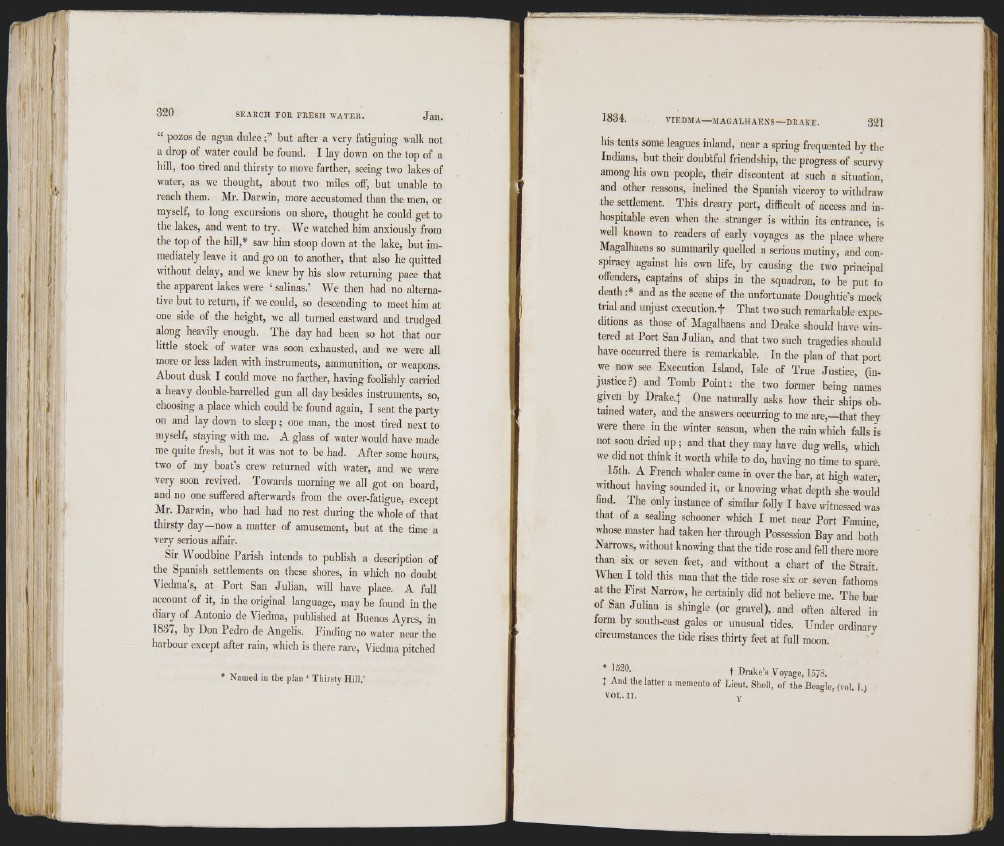
'1
■f-
i'l <
' a-
1 li
Í ' ll
' It
I ' fl
J
“ pozos de agua d u l c e b u t after a very fatiguing walk not
a drop of water could be found. I lay down on the top of a
hill, too tired and thirsty to move farther, seeing two lakes of
water, as we thought, about two miles off, but unable to
reach them. Mr. Darwin, more accustomed than the men, or
myself, to long excursions on shore, thought he could get to
the lakes, and went to try. We watched him anxiously from
the top of the hill,* saw him stoop down at the lake, but immediately
leave it and go on to another, that also he quitted
without delay, and we knew by his slow returning pace that
the apparent lakes were ‘ salinas.’ We then had no alternative
but to return, if we could, so descending to meet him at
one side of the height, we all turned eastward and trudged
along heavily enough. The day had been so hot that our
little stock of water was soon exhausted, and we were all
moi-e or less laden with instruments, ammunition, or weapons.
About dusk I could move no farther, having foolishly carried
a heavy double-barrelled gun all day besides instruments, so,
choosing a place which could be found again, I sent the party
on and lay down to sleep; one man, the most tired next to
myself, staying rith me. A glass of water would have made
me quite fresh, but it was not to be had. After some hours,
two of my boat’s crew returned with water, and we were
very soon revived. Towards morning we all got on board,
and no one suffered afterwards from the over-fatigue, except
Mr. Darwin, who had had no rest during the whole of that
thirsty day—now a matter of amusement, but at the time a
very serious affair.
Sir Woodbine Parish intends to publish a description of
the Spanish settlements on these shores, in which no doubt
Viedma’s, at Port San Julian, will have place. A full
aroount of it, in the original language, may be found in the
diary of Antonio de Viedma, published at Buenos Ayres, in
1837, by Don Pedro de Angelis. Finding no water near the
harhour except after rain, which is there rare, Viedma pitched
• Named in the plan ‘ Thirsty Hill.’
VIEDMA MAGALHAENS DRAKE. 321
his tents some leagues inland, near a spring frequented by the
Indians, but their doubtful friendship, the progress of scurvy
among his own people, their discontent at such a situation,
and other reasons, inclined the Spanish viceroy to withdraw
the settlement. This dreary port, difficult of access and inhospitable
even when the stranger is within its entrance, is
well known to readers of eaily voyages as the place where
Magalhaens so summarily quelled a serious mutiny, and conspiracy
against his own life, by causing the two principal
offenders, captains of ships in the squadron, to be put to
death :* and as the scene of the unfortunate Doughtie’s mock
trial and unjust execution.f That two such remarkable expeditions
as those of Magalhaens and Drake should have wintered
at Port San Julian, and that two such tragedies should
have occurred there is remarkable. In the plan of that port
we now see Execution Island, Isle of True Justice, (injustice.?)
and Tomb Point: the two former being names
given by Drake.] One naturally asks how their ships obtained
water, and the answers occurring to me are, that they
were there in the winter season, when the rain which falls is
not soon dried up ; and tliat they may have dug wells, which
we did not think it worth while to do, having no time to spare.
15th. A French whaler came in over the bar, at high water,
without having sounded it, or knowing what depth she would
find. The only instance of similar folly I have witnessed was
that of a sealing schooner which I met near Port Famine,
whose master had taken her through Possession Bay and both
Narrows, without knowing that the tide rose and fell there more
than six or seven feet, and without a chart of the Strait.
When I told this man that the tide rose six or seven fathoms
at the First Narrow, he certainly did not believe me. The bar
of San Julian is shingle (or gravel), , and often altered in
form by south-east gales or unusual tides. Under ordinary
circumstances the tide rises thirty feet at full moon.
t Drake’s Voyage, 1578.
Í And the latter a memento of Lieut. Sholl, of the Beagle, (vol. I 1
VOL. I I . V